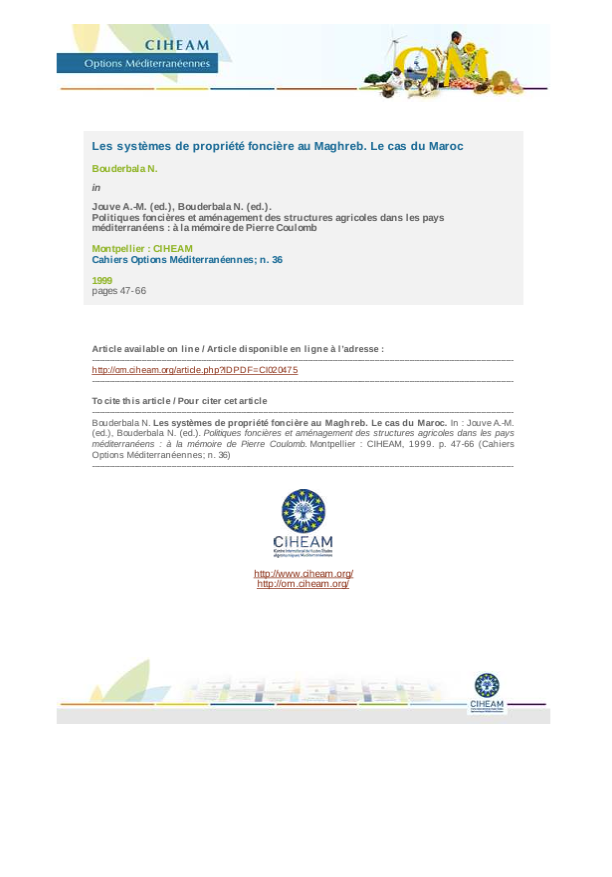Location
Founded in 1962, the CIHEAM is a Mediterranean intergovernmental organisation devoted to the sustainable development of agriculture and fisheries, food and nutrition security and rural and coastal areas.
It is composed of 13 member States (Albania, Algeria, Egypt, France, Greece, Italy, Lebanon, Malta, Morocco, Portugal, Spain, Tunisia and Turkey) and operates through its 4 Institutes based in Bari (Italy), Chania (Greece), Montpellier (France) and Zaragoza (Spain) and a General Secretariat based in Paris.
The CIHEAM collaborates with several international and regional organisations.
OUR IDENTITY
We believe in a UNITED MEDITERRANEAN where the sustainable development of agriculture, food security and territorial cohesion are the seeds of social stability and inclusive growth.
We promote MULTILATERAL COOPERATION through specialised training, networked research, scientific diplomacy and political partnerships.
We contribute to REGIONAL STABILITY, food and nutrition security, health of populations, the protection of the environment and increased access to the job market of youth.
We strongly believe in INTERCULTURAL DIALOGUE and DIVERSITY. Several nationalities and religions coexist within the CIHEAM.
We believe in KNOWLEDGE SHARING and the enhancement of links between knowledge and development needs.
We promote POLITICAL DIALOGUE through the organisation of meetings of the Agricultural Ministries of our member States.
We develop our actions within an ACCOUNTABILITY framework and implement them through a result-based management approach.
Members:
Resources
Displaying 21 - 25 of 25Introduction to ILWIS GIS tool
ILWIS for Windows is a Windows-based, integrated GIS and Remote Sensing application consisting of: (i) Display of raster and multiple vector maps in map windows; (ii) Display of tables in table windows; (iii) Interactive retrieval of attribute information, (iv) Image processing facilities, (v) Manipulation of maps in a Map Calculator; (vi) Manipulation of tables in a Table Calculator; (vii) GIS analysis tools and (viii) Script language to perform \'batch\' jobs. With Windows, you can start one operation and keep it running while you start one or more additional applications.
Application of INSPIRE directive to water management on large irrigation areas
The goal of this paper is to illustrate how INSPIRE can facilitate orientation and advice to calculate the water requirements of crops. These technologies can provide information adapted to specific conditions, updated daily and in an interactive way. These tools permit the integration and management of georeferenced agroclimatic data, soil maps, quality of waters, crop information and technical parameters of a farm.
Developing a coherent monitoring system for Mediterranean grasslands
Grasslands are one of the world's most widespread vegetation types, covering nearly 20% of the land surface and represent a major source of production of agricultural products. However, grassland vegetation across the Mediterranean region is changing at an unanticipated rate. These changes are the result of climatic and socio-economic changes.
Methods and approaches used for assessing ecosystem services provided by grazing systems
To date, scientific literature provided a vast amount of studies on Ecosystem Services (ES) underpinning their benefits to human well-being. Livestock grazing systems occupy a vast area of the terrestrial surface and are essential to the livelihood especially for vulnerable communities. Grazinglands are able to provide a wide array of ES depending on management practices and intensity. In this perspective and according to the Millennium Ecosystem Assessment (MA) framework, the paper reviews the methods and the approaches used in the analysis of the main ES provided by grazing systems.
Les systèmes de propriété foncière au Maghreb. Le cas du Maroc
Les systèmes de propriété foncière dans les trois pays du Maghreb nous apparaissent aujourd’hui comme marqués par leurs particularités. Cependant pour l’essentiel, leurs différences sont le résultat, tardif, des politiques foncières conduites par les trois Etats depuis l’indépendance. [... ]




